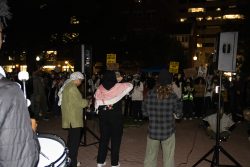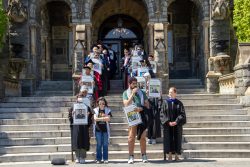Although Georgetown announced this week that it would increase the aid it gives to undergraduate veterans fivefold, veterans’ advocates on campus say the new aid package is still not effective in controlling the cost of a Georgetown education.
In comparison to the $1,000 undergraduates received from Georgetown through the Yellow Ribbon program in the 2009-10 school year, eligible veterans will receive $5,000 from the University in the coming year. For every $5,000 the University gives its students in benefits, the U.S. Department of Veterans Affairs provides a matching grant of $5,000, as is required under the Post-9/11 Veterans Educational Assistance Act of 2008.
The Yellow Ribbon Program does not necessarily guarantee that undergraduate veterans will receive $10,000 in addition to their need-based financial aid packages , though. Georgetown’s different schools offer financial aid packages based on need, and the money that veterans receive from the Yellow Ribbon program is often subtracted from these other financial aid packages.
Barbara Mujica, a professor in the Spanish and Portuguese department and faculty advisor for the Georgetown University Students Veterans Association, was not pleased with the changes, writing in an e-mail that this kind of Yellow Ribbon rate is “considered an insult by many veterans.”
Veterans also receive different amounts of financial benefits from the respective schools within the University. While undergraduates receive $5,000 from the University, students enrolled in the graduate sector of the School of Continuing studies receive $10,140 in benefits. Veterans who are graduate students will not see any increase in their benefits.
“This was handled poorly because [the conditions for the financial aid package] were not explained prior to the students receiving the money,” Erick Brine, a graduate student and the President of GUSVA, said. “There is no net benefit for them.”
Brine also pointed out that there is also a large discrepancy between the aid that Georgetown University gives to its veterans and the benefits that other peer universities offer.
The $9,376 total compensation offered to Georgetown undergraduate veterans in 2009 is significantly lower than the $77,309 offered by Dartmouth College, for example, or the $65,208 offered by Columbia University, according to the U.S. News and World Report.
Peter Nesbitt (SFS ‘11) wrote in an e-mail that the problem lies in a provision in the Post-9/11 GI bill that says that veterans must receive at least 100 percent of the tuition of the most expensive in-state public university. In D.C., the most expensive and only public school, the University of the District of Columbia, costs only $7,376 a year.
However, it hasn’t prevented American University or George Washington University from providing enough monetary benefits to cover veterans’ full tuitions, Nesbitt said.
“[American and GWU] demonstrate their commitment to veterans despite a law that puts their universities in poor positions,” Nesbitt wrote. “Georgetown has decided to pass the effects of the poorly written law onto veteran students.”
The absence of a central veterans’ office in the University can make the bureaucracy of the VA all the more difficult for student veterans to handle. Brine said some students are fined when there are miscommunications between the University and the VA regarding tuition payments. For students who have to pay the extra tuition fees, this can be painful.
Students are currently meeting with administrators to establish a veterans’ office, which Brine hopes will be operational sometime next year.
“The problem is there are places where there is support in the university, but the university has not informed the student veterans very well on [where these resources are],” Brine said. “It is not very helpful when you do not know who to contact. It’s not a contentious relationship, but there is still a long way to go.”
In the meantime, student veterans’ advocates are trying to get the University to create an official record of all of the veterans on campus, which would enable the University to inform veterans of scholarships that specifically pertain to them and help veterans to establish an alumni network program. “Everyone has been extremely supportive of veterans at Georgetown and there has not been anyone here that has not provided the level of access and support that we wanted,” Brine said. “But it is a long process.”





You might want to check your numbers, there are many other public colleges in the US that are more expensive for in state residents than WDC’s tuition rate.
Meg,
That’s right, and that’s where the problem is for veterans attending college in DC. For example, the most expensive public college for in state residents in Massachusetts costs $35,574. That means that veterans attending another college in MA will be covered up to that amount by the GI Bill, and the tuition discrepancy between that and a private school like Harvard U is only off by $3,000. However, since DC is counted as a state, veterans who attend a university or college in DC will only be compensated for the $7,376 listed above by the GI Bill–not by the most expensive public school tuition rate in the US, nor by the most expensive public school tuition rates in the surrounding states of Maryland or Virginia. The discrepancy between this amount and Georgetown’s tuition is over $20,000.
Sorry for the confusion–I hope I was able to clarify!
Holly are you a veteran?
Hi Stephen,
No, I’m not a veteran.
I think after the ‘Catholic debacle’ that Christopher Hitchens mentions regarding children, that veterans and their benefits would be the last people or thing to prey upon in extraordinarily poor fashion.
I have respect for slobs though, they really try imitate what human beings do despite the religious impediment for actually ever having to do it properly. I am not religious in the sense that I would steal from the positive behalf of veterans,and if I was religious, that would be written down as an invitation to hell. I would like to dismiss any idea that this work is being done or if any work is being done in semi-constructive fashion on behalf of veterans here at Georgetown. Some may say they are working but it can properly be maintained the work is retroactive – meaning … it should of been done years ago.
It’s a lose, lose, lose situation and it makes the best conservative a lazy liberal, while it makes the best liberal look like a lazy conservative. You forgot to make mention veterans that are from the Washington D.C. area, maybe next time.